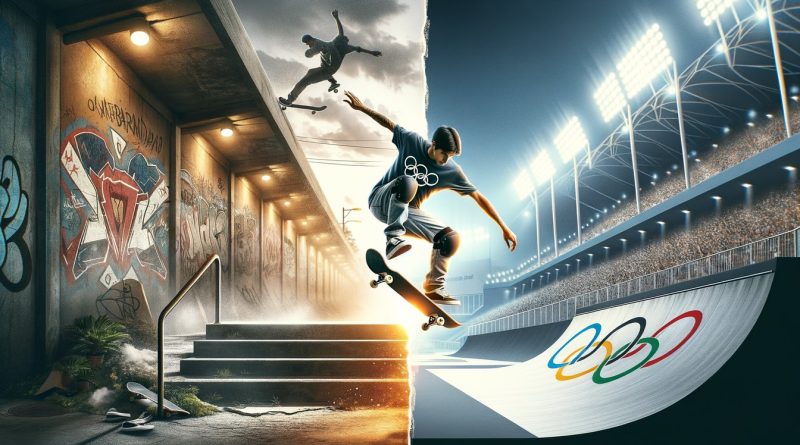Breaking Barriers: The Rise of Skateboarding in the Olympic Arena
The Olympic Games have long been the pinnacle of athletic achievement, showcasing traditional sports that have captivated audiences for decades. However, the landscape of the Olympics is evolving, and one of the most exciting developments in recent years has been the inclusion of skateboarding. This article explores how skateboarding is transforming the Olympic experience, appealing to younger generations, and paving the way for a more diverse and inclusive sporting world.
From Street to Stadium: Skateboarding’s Olympic Journey
Skateboarding made its Olympic debut at the Tokyo 2020 Games (held in 2021 due to the pandemic), marking a significant milestone in the sport’s history. The decision to include skateboarding was part of the International Olympic Committee’s (IOC) efforts to modernize the Games and attract younger viewers. The move has proven successful, with skateboarding quickly becoming one of the most-watched events and generating buzz across social media platforms.
The Olympic skateboarding competition features two disciplines: street and park. Street skateboarding simulates urban environments with stairs, handrails, and benches, while park skateboarding takes place in a bowl-shaped course with complex curves and transitions. These formats showcase the versatility and creativity inherent in skateboarding, allowing athletes to demonstrate their unique styles and tricks.
Appealing to a New Generation
One of the most significant impacts of skateboarding’s inclusion in the Olympics has been its ability to engage younger audiences. The sport’s rebellious roots and association with youth culture resonate with millennials and Gen Z, who may have previously felt disconnected from traditional Olympic events. Social media has played a crucial role in this engagement, with skateboarding highlights and behind-the-scenes content going viral and introducing the sport to new fans worldwide.
Moreover, the youthful energy of skateboarding has breathed new life into the Olympic atmosphere. The laid-back attitudes of skateboarders, their camaraderie, and the sport’s emphasis on individual expression have created a refreshing contrast to the intense competitiveness often associated with other Olympic events.
Diversity and Inclusion in Action
Skateboarding’s inclusion in the Olympics has also highlighted the sport’s potential for promoting diversity and inclusion. Unlike many traditional Olympic sports, skateboarding has a relatively low barrier to entry, making it accessible to athletes from various backgrounds and economic situations. This accessibility has led to a diverse field of competitors, with athletes from countries not typically associated with Olympic success making their mark on the global stage.
The sport has also been at the forefront of gender equality in the Olympics. Skateboarding competitions feature an equal number of events for men and women, and the prize money is distributed equally. This commitment to gender parity has set an example for other sports and contributed to the ongoing conversation about equality in athletics.
Challenges and Controversies
Despite its success, skateboarding’s inclusion in the Olympics has not been without challenges. Some within the skateboarding community have expressed concerns about the sport’s “institutionalization,” fearing that Olympic involvement might compromise its rebellious spirit and creative freedom. Others worry about the pressure placed on young athletes, as many top skateboarders are teenagers or even pre-teens.
The judging criteria for Olympic skateboarding have also been a topic of debate. Balancing the need for objective scoring with the sport’s emphasis on style and creativity has proven challenging, leading to ongoing discussions about how best to evaluate performances.
Looking Ahead: The Future of Olympic Skateboarding
As skateboarding prepares for its second Olympic appearance at the Paris 2024 Games, the sport continues to evolve and adapt to its new global platform. The IOC and skateboarding federations are working together to address challenges and refine the competition format, ensuring that the essence of skateboarding is preserved while meeting Olympic standards.
The inclusion of skateboarding in the Olympics has already inspired a new generation of athletes to pursue their dreams on a global stage. Skateparks are being built in communities around the world, providing safe spaces for young people to practice and fostering local skateboarding scenes. This grassroots growth is likely to lead to an even more diverse and skilled pool of athletes in future Olympic Games.
Conclusion
Skateboarding’s journey from countercultural pastime to Olympic sport represents a significant shift in the world of athletics. Its inclusion has not only brought fresh energy and younger audiences to the Olympic Games but has also opened doors for athletes from diverse backgrounds to shine on a global stage. As skateboarding continues to grow and evolve within the Olympic framework, it serves as a powerful example of how traditional sporting events can adapt to remain relevant and inspiring in the 21st century.
As we look towards future Olympic Games, the success of skateboarding may pave the way for other non-traditional sports to join the Olympic family, further diversifying and enriching the world’s most prestigious sporting event. The rise of skateboarding in the Olympic arena is more than just a trend – it’s a testament to the power of sport to unite, inspire, and break barriers.

